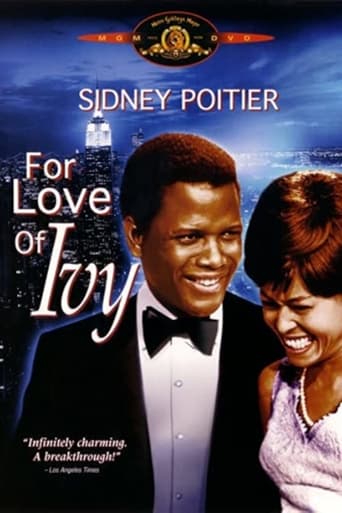tavm
Just watched this on Netflix disc with Mom. She thought it was weird and I found myself half-agreeing with all the dated '60s clothes abounding in many scenes. While both Mom and me laughed at some scenes, I don't think either of us realized this was a comedy since there wasn't much in the lines we thought was funny. Still, I myself liked the dialogue between Sidney Poitier and Abbey Lincoln that permeated throughout and was glad with the way it ended for them. Interesting seeing Carroll O'Connor as someone other than Archie Bunker and a young Beau Bridges early in his film career. In summary, For Love of Ivy is worth a look. Oh, and unlike many of his characters during this period, Mr. Poitier doesn't seem so noble here...
The_Movie_Cat
Sidney Poitier made some films that have become largely forgotten over the course of his career. When you've made over 40 films in your initial run, pre-first retirement, then there's naturally going to be some that slip through the cracks. And today it seems hardly anyone talks about Brother John, The Lost Man, Good-bye My Lady or Virgin Island. But what could perhaps be surprising is that the film he made right off the back of his biggest commercial success should be so overlooked today.In 1967 Sidney Poitier was the most successful box office star in the world with three big hits in cinemas. Just one year later and he's only got one release, this stagily-directed semi-farce based on Poitier's own storyline. The main theme sees Poitier play possibly his most dislikeable character, arrogant businessman Jack Parks, match-made against his will with a black maid seeking some form of personal empowerment. The film concludes with a title song, informing us that what that empowerment amounts to is the need for love. That's right... although the film touches on themes of emancipation and black pride over the course of its runtime, it turns out all the titular Ivy needed all along was a good shag. Chief matchmaker Beau Bridges does the best with what he's got as a representative of the 60s counterculture, but his stoner fixations seem today, like the main subtext of the movie, somewhat quaint and parochial; patronising rather than groundbreaking. Look out also for Parks' angered expression when Bridges' characters asks if he's gay, or the confused and confusing monologue from Bridges at the end.However, such flaws are perhaps not always that of the movie; this was the first depiction of a romantic relationship between a black man and woman in mainstream Hollywood, and was quite groundbreaking for its time. It was just four years after this movie that Poitier had a go at directing himself... you do wonder if this was more than a coincidence, as the TV Movie style framing here makes the direction of Guess Who's Coming To Dinner look like the work of Scorcese. Ultimately it's a film that hasn't aged well, and a poor follow-up to his three '67 vehicles... though it may not have been so at the time.
moonspinner55
Sidney Poitier developed the original story for this fantasy-romance between a black maid working for a neurotic, rich white family out on Long Island and a handsome, confirmed bachelor--a partner in a trucking firm which deals (rather craftily) in illegal gambling on the side. In the most prominent role, Abbey Lincoln (real-life jazz vocalist who resembles a young Dionne Warwick) has a firm jaw and a shyly self-conscious manner, but she grows on you--and in her lighter moments displays a tentative yet winning smile and personality. After a static, stilted beginning, the movie picks up some steam and quickly overcomes its contrived set-up, and Poitier is full of jubilant charisma. Nice end-credits theme song, written by Quincy Jones and performed by Shirley Horn, received an Oscar nomination. Good fun! *** from ****
harry-76
America' love affair with Sidney Poitier, which reached its peak in the 60s, resulted in the need for star vehicles for the actor. One such piece was based on a story conceived by Poitier. Called, "For Love of Ivy," it cast the charismatic actor in a role in which he could wear the latest fashions--slickly tailored suits, sweaters, tuxes, and the like. His female costar, Abbey Lincoln likewise dresses in a varied and stylish wardrobe, looking quite pert and attractive.The two seem to enjoy their little romantic romp in a lightweight domestic comedy, supported by Beau Bridges and Carroll O'Connor. Too bad the script tends to become a bit limp about midpoint, and never quite regains its zip.
The movie plays better in home video format, where one can lounge back and relax in home surroundings, rather than in the more formal setting of the theater. Then the proceedings become a bit sluggish, it helps to be comfortable. Still, it's fun watching these attractive performers engage in their comedic entanglements, in a brightly designed production, and to a Quincy Jones score.


